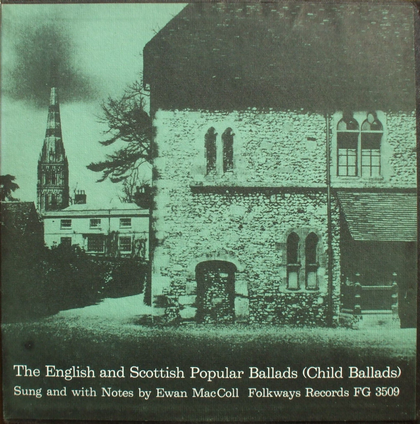Ewan MacColl
『The English and Scottish Popular Ballads (Child Ballads)』
LP: Folkways Records
FG 3509

English and Scottish Popular Ballads
Child Ballads
sung by Ewan MacColl
Side I
1. Johnnie O Breadisley (Child #114) (Johnie Cock)
2. The Dowie Dens O' Yarrow (Child #214)
3. Lord Randall (Child #12)
4. Sir Patrick Spens (Child #58)
5. The Burning O' Auchendoun (Child #183) (Willie MacIntosh)
6. Our Goodman (Child #274)
7. The Rantin Laddie (Child #240)
Side II
1. Bawbee Allan (Child #84) (Barbara Allan)
2. The Brown Girl (Child #73) (Lord Thomas and Fair Annet)
3. The Three Ravens (Child #26)
4. The Bonnie Earl O' Murray (Child #181)
5. The Battle Of Harlaw (Child #163)
6. Thomas Rhymer (Child #37)
Library of Congress Catalogue Card No. R 61-1869
(C) 1961 Folkways Records and Service Corp.
43 W. 61st ST., N.Y.C., U.S.A.
Cover design by Ronald Clyne
「"Definded in its simplest terms, the ballad is a folksong that tells a story. Whatever may be added to this statement is by way of amplification, to explain and clarify, merely, since the whole truth of the matter is in it. What we have come to call a ballad is always a narrative, is always sung to a rounded melody, and is always learned from the lips of others rather than by reading."」
◆本LPについて◆
イワン・マッコールによるイングランドとスコットランドのバラッド集。このあとに「Vol. 2」と「Vol. 3」が出ています。
ジャケットは厚紙に黒い紙を貼った上にさらに写真図版&文字が印刷された紙が貼られています。ブックレット(全6頁)に序文と楽曲解説&歌詞。
Thomas Rhymer (Child #37)
「Thomas Rymour
True Thomas lay on Huntlie bank,
A ferlie he spied wi' his e'e,
And there he saw a lady bright,
Come riding down by the Eildon Tree.
Her skirt was o' the grass-green silk,
Her mantle o' the velvet fyne,
At ilka tett of her horse's mane
Hung fifty siller bells and nine.
True Thomas he pull'd aff his cap
And louted low down to his knee:
"All hail, thou mighty Queen of Heaven!
For thy peer on earth I never did see."
"O no, O no, Thomas", she said,
That name does not belong to me;
I am but the queen of fair Elfland
That am hither come to visit thee.
"Harp and carp, Thomas", she said,
"Harp and carp along wi' me,
And if ye dare to kiss my lips,
Sure of your body I will be."
"Betide me weal, betide me woe,
That weird shall never daunton me;"
Syne he has kissed her rosy lips,
All underneath the Eildon Tree.
"Now ye maun go wi' me," she said,
"True Thomas, ye maun go wi' me,
And ye maun serve me seven years,
Thro' weal and woe, as say chance to be."
She mounted on her milk-white steed,
She's ta'en True Thomas up behind,
And aye whene'er her bridle rung
The steed flew faster than the wind.
O they rade on, and farther on -
The steed gaed swifter than the wind
Until they reached a desert wide,
And living land was left behind.
"Light down, light down now, True Thomas,
And lean your head upon my knee;
Abide and rest a little space,
And I will show you ferlies three.
"O see ye not yon narrow road,
So thick beset with thorns and briars?
That is the path of righteousness,
Tho' after it but few enquires.
"And see ye not that braid, braid road
That lies across that lily leven?
That is the path of wickedness,
Tho' some call it the road to heaves.
"And see ye not that bonny road
That winds about the fernie brae?
That is the road to fair Elfland
Where thou and I this night maun gae.
"But, Thomas, ye maun hold your tongue,
Whatever ye may hear or see,
For if you speak word in Elflyn land
Ye'll ne'er get back to your ain countrie."
Syne they came on to a garden green,
And she pu'd an apple frae a tree;
"Take this for thy wages, True Thomas,
It will give the tongue that can never lie."
"My tongue is mine ain," Tru Thomas said:
"A guidly gift ye wad gie to me!
I neither dought to buy or sell,
At fair or tryst where I may be.」
「Thomas of Erceldoune, the 13th. Century poet, was author of a long poem describing a visit to Elfland and the supernatural events which took place there. The poem served as a basis for the 15th. century romance which, in turn, probably provided the raw material for this ballad.
Child published 3 texts.
Learned from print.」